Don Engebretson the “Renegade Gardener” is one of the most entertaining and enlightening garden writers on the internet, and with good reason. He doesn’t just write about gardening – he owns a landscape business and actually gets his hands dirty.
Don’s knowledge and passion for gardening and landscape design make him a very highly sought-after speaker at home shows and garden club events across the nation. Those in the landscape industry value his expertise and the highly informative website he writes on a variety of gardening topics.
Don was kind enough to take time out of his busy schedule to answer a few questions on gardening and stonework for us, and we think you’ll find his answers helpful and interesting. Enjoy!
Books by Renegade Gardener:
- Perennials for Minnesota and Wisconsin
- Annuals for Minnesota and Wisconsin
- Tree and shrub Gardening for Minnesota and Wisconsin
Tired of searching Google for gardening tips and finding nothing but useless fodder?
Then visit Renegade Gardener. You’ll find what you’re looking for and still have time to garden.
1. Hi Don, welcome to Better Lawn Care and thank you for joining us. Please tell everyone a little bit about the Renegade Gardener.
I’m a native Minnesotan of Norwegian descent, and like all native Minnesotans as I’ve grown older I’ve given up trying to figure out why my ancestors settled here. What, Florida was already settled? You didn’t have the horses to make it to California, or Oregon? I guess not. The Norwegians and the Swedes and Finns, they just kept trudging north until it looked and felt like home. Spring, Summer, Fall, of course, Minnesota’s gorgeous. And in the winter, well, it’s white and cold.
Stonework by Renegade Gardener
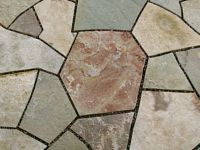
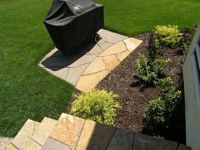
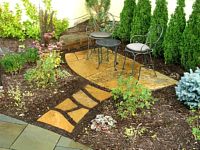
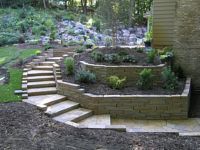
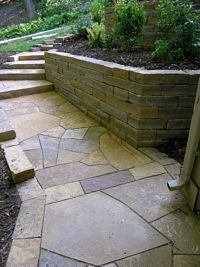
2. Your stonework is top-notch, very classy and beautiful. In your opinion, what is it about your style and work that sets it apart from other landscapers?
Thank you for the compliment. There are a lot of factors that combined to create my style of stonework, from the very start. My first stone project was a garden path I installed in my own garden, back when I was working in the corporate world, long before I started my landscaping business. I bought some Rocky Mountain quartzite, a lovely, shiny flagstone, fairly small pieces, and set out to build a thirty-foot path.
I would place each piece and when a piece was too wide, and didn’t keep a nice running line along the perimeter, I’d think, that doesn’t look right. Nor did I like it when two pieces didn’t line up tight. So I flipped and turned the pieces, and would break some, and fit all the stone together like the jigsaw pieces they were. I didn’t own a single bit of stone equipment, no hammers or chisels or saws or splitters. I just kept fitting them together until my path was a uniform 20 inches wide, curving, with half-inch, uniform margins between the stones. Took me all summer.
So years later, when I started doing patios and sidewalks and pathways, I wanted that tight fit. As I started buying saws and stone equipment and learning how to saw and break the stone, it just developed. I like a tight fit, a mosaic, like stained glass. If one piece of flagstone doesn’t fit quite right, well, you can chisel it or saw it. I guess the main factor is, I’m anal. I don’t like a patio that has a quarter-inch margin over here, and then a two-inch gap filled with sand over there.
3. What inspired you to develop stoneworking skills?
The stone. What inspires someone to paint, or start building wood furniture, or restore old boats? It’s the material. It grabs you. I was grabbed by a stone. It’s so gorgeous. No two pieces are the same.
4. You warn renegade gardeners to be “cautious when perusing the plethora of products and plants sold by the commercial gardening industry”, what is the most useless mass-marketed product?
Weed fabric. People lay it down on the dirt to stop weeds. Then they throw their mulch on top of it. Except for the mulch, in the proper thickness, does exactly what the weed fabric was supposed to do–block the sun from germinating annual weed seeds. But now, the weed fabric stops the mulch from decomposing over a year or two and being drawn into the soil, as fresh organic matter. Then the time will come when you want to dig up a plant or move something or add a plant, and that weed fabric bites you right in the butt. Useless.
5. In your Myth of the Week article “Glyphosate is the Agent Orange of our time”, you confess that your “attitudes about chemicals have changed over the years”, what is the Renegade Gardener’s chemical doctrine?
Pretty simple: Everything is a chemical. You don’t allow chemicals in your garden? How on earth do you get anything to grow without H2O?
In the garden, when it comes to using fungicides and pesticides, the choice is not between chemical products and organic products, it’s between synthetic chemical products and organic chemical products. Either way, you are using a chemical. Think that the organic insecticidal soap or horticultural oil you use is harmless and safe. Try pouring a little in a fish pond, or get some in your eyes. Some synthetic chemicals used in gardening are safer for humans, wildlife, and the earth than some organic chemicals, and vice-versa.
6. Do you think organic pesticides are safe?
Safe when used as directed. Read the directions, and if it says wear rubber gloves and long sleeves, do it. I use organic chemical products all the time. The big problem with them is that people see “organic” on the label, and they think if a little is good, a lot is better. So they overuse it. And the EIQ (Environmental Impact Quotient) on some of these products is right up there, or exceeding, the EIQ of the synthetics.
7. The “Don’t Do That” pages on your website point out common mistakes made by homeowners and sub-par landscapers, what is your biggest gardening pet peeve?
Tree circles. If you plant a tree in a yard, don’t ring it with brick or small boulders or give it a tutu of daylilies. There is no sense of flow and continuity as you gaze at the landscape. The trees have been annexed, they are now single, little individual islands that don’t belong.
8. Why do you think lawn fertilizers are being blamed as the major source of phosphorus pollution in our waters?
Because that’s the easy villain. They contain phosphorus, so politicians and environmentalists went after them before all the research was in. Now we know that phosphorus enters waterways in many ways, the worst being storm drains that pick up soil and plant debris from streets, all packed with phosphorus. The phosphorus in lawn fertilizer is a minor player. It was probably good to ban phosphorus unless a soil test shows your lawn really needs it, every little bit helps, but when everyone was pointing their finger at lawn fertilizers, the complete cause for excess algae growth in lakes and ponds and rivers hadn’t been discovered.
9. Don, thanks again for sitting down with us today. For this last question, please tell us about when you first realized you had a strong passion for gardening.
A few years after I bought my first house, I had discovered Wisconsin trap rock, this really cool, blue-gray, angular granite you could buy as rip-rap, smaller pieces in the ten- to fourteen-inch range. I ringed all my raised beds with it. It was angled, and if you took your time you could fit it together very tight as you moved along the garden edge.
So I was at work, at my office, answering phone calls and writing letters and working on proposals, all work I enjoyed, but what I was really looking forward to was getting off work and getting home so I could spend about another hour fitting that stone together.
Natural fertilizers add organic matter to the soil and stimulate microbial activity. They are slow release, reducing the chances of salt damage (burn) to grass plants and reducing the chance of nutrients polluting waters by runoff or leaching.
